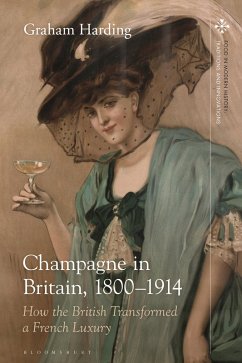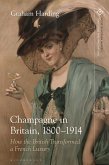Winner of the 2022 OIV AWARD 2022 in the History category
From its introduction to British society in the mid-17th century champagne has been a wine of elite celebration and hedonism. Champagne in Britain, 1800-1914 is the first book for over a century to study this iconic drink in Britain.
Following the British wine market from 1800 to 1914, Harding shows how champagne was consumed by, branded for and marketed to British society. Not only did the champagne market form the foundations of the luxury market we know today, this book shows how it was integral to a number of 19th century social concerns such as the 'temperate turn', anxieties over adulteration and the increasingly prosperous British middle class.
Using archival sources from major French producers such as Moët & Chandon, Veuve Clicquot and Pommery & Greno alongside records from British distributors, newspapers, magazines and wine literature, Champagne in Britain shows how champagne became embedded in the habits of Victorian society. Illustrating the social and marketing dynamics that centered on champagne's luxury status, it reveals the importance of fashion as a driver of choice, the power of the label and the illusion of scarcity. It shows how, through the reach of imperial Britain, the British taste for Champagne spread across the globe and became a marker for status and celebration.
From its introduction to British society in the mid-17th century champagne has been a wine of elite celebration and hedonism. Champagne in Britain, 1800-1914 is the first book for over a century to study this iconic drink in Britain.
Following the British wine market from 1800 to 1914, Harding shows how champagne was consumed by, branded for and marketed to British society. Not only did the champagne market form the foundations of the luxury market we know today, this book shows how it was integral to a number of 19th century social concerns such as the 'temperate turn', anxieties over adulteration and the increasingly prosperous British middle class.
Using archival sources from major French producers such as Moët & Chandon, Veuve Clicquot and Pommery & Greno alongside records from British distributors, newspapers, magazines and wine literature, Champagne in Britain shows how champagne became embedded in the habits of Victorian society. Illustrating the social and marketing dynamics that centered on champagne's luxury status, it reveals the importance of fashion as a driver of choice, the power of the label and the illusion of scarcity. It shows how, through the reach of imperial Britain, the British taste for Champagne spread across the globe and became a marker for status and celebration.









